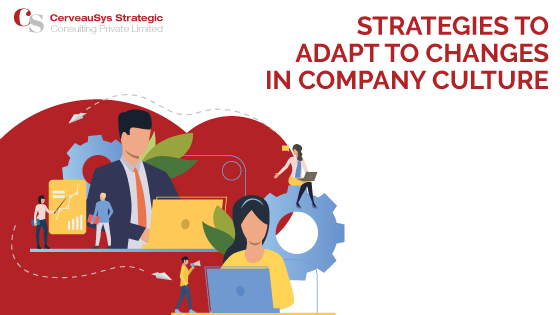Evolving Company Culture: Strategies for Adapting to Change
Imagine a bustling marketplace. The vendors are selling their wares, the customers are haggling, and the atmosphere is electric. But suddenly, a new technology emerges that disrupts the traditional way of doing business. The vendors who cling to their old methods will struggle to survive, while those who embrace the new technology will thrive.
In today’s rapidly changing business landscape, organizations are facing a similar challenge. The rules of the game are constantly evolving. Think of your company as a living organism. It needs to adapt to its environment to survive and thrive. Company culture is like the DNA of this organism. It determines how your employees think, behave, and interact.
At CerveauSys Strategic, the leading Strategy and Management Consulting firm in Pune, we believe that company culture is the lifeblood of any successful business, and by embracing strategies to adapt to change, organizations can foster a dynamic, resilient, and high-performing workforce. If your company culture is outdated, it’s like trying to run a marathon in flip-flops. You’ll be out of breath and struggling to keep up. But if your company culture is adaptable, it’s like wearing the latest high-tech running shoes. You’ll be able to easily navigate any terrain and reach your goals.
Let’s explore the key strategies that can help your organization navigate the challenges of changing company culture and emerge stronger than ever before.
Key Strategies for Adapting to Changing Company Culture
1. Foster Open Communication and Transparency
Effective communication is the foundation of a thriving company culture. As your organization navigates change, it’s essential to foster open and transparent communication channels that encourage employees to voice their concerns, ideas, and feedback. Regular town hall meetings, one-on-one check-ins, and open-door policies can help create an environment where employees feel heard and valued.
2. Embrace Flexibility and Adaptability
In an ever-changing business landscape, the ability to adapt and respond quickly to new challenges is paramount. Encourage your organization to embrace flexible work arrangements, such as remote work or hybrid models, and empower employees to find creative solutions to emerging problems. By fostering a culture of adaptability, you can help your team stay agile and resilient in the face of change.
3. Invest in Employee Development and Upskilling
As new technologies, processes, and industry trends emerge, it’s crucial to invest in the ongoing development and upskilling of your employees. Offer training programs, mentorship opportunities, and career development initiatives to help your team stay ahead of the curve. By empowering your employees to grow and evolve, you can build a workforce that is equipped to navigate the challenges of a changing company culture.
4. Foster Collaboration and Teamwork
In a rapidly changing environment, collaboration and teamwork become even more critical. Encourage cross-functional collaboration, team-building activities, and the sharing of knowledge and best practices. By fostering a culture of teamwork, you can help your employees to support one another, share resources, and find innovative solutions to complex problems.
5. Embrace Diversity, Equity, and Inclusion
As your company culture evolves, it’s essential to prioritize diversity, equity, and inclusion. Ensure that your organization’s policies, practices, and culture are inclusive and welcoming to individuals from all backgrounds, experiences, and perspectives. By embracing diversity, you can cultivate a more resilient and innovative workforce better equipped to navigate the challenges of change.
6. Lead with Empathy and Compassion
Navigating change can be emotionally and psychologically taxing for employees. As a leader, it’s crucial to lead with empathy and compassion, and to provide your team with the emotional support and resources they need to thrive. This may include offering mental health resources, implementing wellness programs, and fostering a culture of care and support.
7. Continuously Assess and Adapt
Finally, it’s essential to continuously assess and adapt your company culture as it evolves. Regularly gather feedback from employees, monitor key performance indicators, and be willing to make adjustments as needed. By maintaining a nimble and responsive approach, you can ensure that your organization’s culture remains aligned with the changing needs of your business and your employees.
The Bottom Line
Adapting to change in company culture is a complex and dynamic process, but by embracing these seven strategies, you can position your organization for long-term success. At CerveauSys Strategic, the leading Strategy and Management Consulting firm in Pune, we are dedicated to helping organizations navigate the challenges of a changing business landscape and build thriving, resilient company cultures.
Our team of experienced consultants specializes in business strategy, human resources, and organizational development, providing customized solutions to help our clients achieve their goals. Whether you’re looking to enhance your communication channels, foster a more adaptable workforce, or cultivate a more inclusive and compassionate company culture, we are here to support you every step of the way.
Contact us today to learn more about how CerveauSys Strategic can help your organization evolve and thrive in the face of change.



